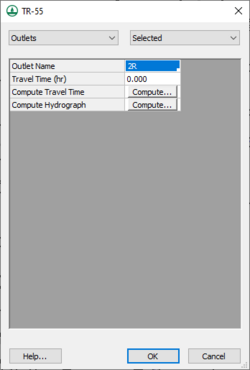WMS:TR-55 Outlet Data: Difference between revisions
From XMS Wiki
Jump to navigationJump to search
No edit summary |
No edit summary |
||
| Line 1: | Line 1: | ||
[[File:TR-55 Outlets.png|thumb|250 px|The ''TR-55'' dialog showing outlet data]] | |||
WMS allows defining the watershed as a single basin or subdivide the watershed into multiple sub-basins. Besides computing peak flows using the standard TR-55 equations, storm hydrographs may also be computed for each basin and then combined/lagged to downstream outlets (junctions) using the TR-55 tabular hydrograph method. | WMS allows defining the watershed as a single basin or subdivide the watershed into multiple sub-basins. Besides computing peak flows using the standard TR-55 equations, storm hydrographs may also be computed for each basin and then combined/lagged to downstream outlets (junctions) using the TR-55 tabular hydrograph method. | ||
Revision as of 14:12, 19 October 2017
WMS allows defining the watershed as a single basin or subdivide the watershed into multiple sub-basins. Besides computing peak flows using the standard TR-55 equations, storm hydrographs may also be computed for each basin and then combined/lagged to downstream outlets (junctions) using the TR-55 tabular hydrograph method.
When creating a watershed with multiple sub-basins, define the time of travel from one outlet (junction) to the next. The travel time for an outlet is defined by selecting the outlet and then entering the appropriate travel time. If desired, use a time computation arc to compute the travel time.
Related Topics
WMS – Watershed Modeling System | ||
|---|---|---|
| Modules: | Terrain Data • Drainage • Map • Hydrologic Modeling • River • GIS • 2D Grid • 2D Scatter |  |
| Models: | CE-QUAL-W2 • GSSHA • HEC-1 • HEC-HMS • HEC-RAS • HSPF • MODRAT • NSS • OC Hydrograph • OC Rational • Rational • River Tools • Storm Drain • SMPDBK • SWMM • TR-20 • TR-55 | |
| Toolbars: | Modules • Macros • Units • Digitize • Static Tools • Dynamic Tools • Drawing • Get Data Tools | |
| Aquaveo | ||
